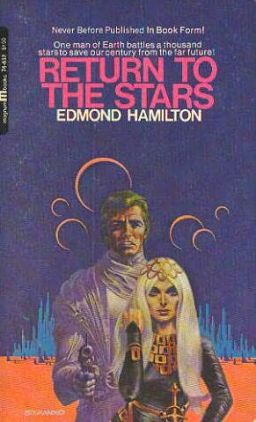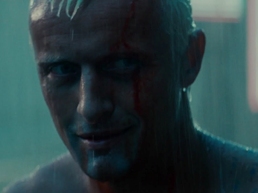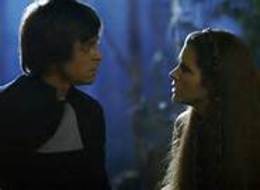Blade Runner: Edmond Hamilton’s Tears in the Rain?

Get this:
I heard the sunrise music that the crystal peaks make above Throon when Canopus comes to warm them. I feasted with the star-kings in the Hall of Stars. And at the end, I led the fleets of the Empire against our enemies, the men from the League of Dark Worlds. I saw the ships die like swarming fireflies off the shores of the Hercules Cluster. I’ve shot the Orion Nebula. I’ve been into the Cloud, where the drowned suns burn in a haze of darkness. I’ve killed men, Doctor. And in that last battle, I —
Oddly familiar? Actually, that’s Gordon’s monologue to his shrink in Edmond Hamilton’s Return to the Stars.
How about this one?
I’ve… seen things you people wouldn’t believe… Attack ships on fire off the shoulder of Orion. I watched c-beams glitter in the dark near the Tannhäuser Gate. All those… moments… will be lost in time, like [small cough] tears… in… rain. Time… to die…
Of course, that’s Roy Batty’s dying monologue in Blade Runner. Hauer is supposed to have improved on the original script, which had…
I have known adventures, seen places you people will never see, I’ve been Offworld and back… frontiers! I’ve stood on the back deck of a blinker bound for the Plutition Camps with sweat in my eyes watching the stars fight on the shoulder of Orion… I’ve felt wind in my hair, riding test boats off the black galaxies and seen an attack fleet burn like a match and disappear. I’ve seen it, felt it…!

Neither version really belongs in Blade Runner!
Ridley Scott’s 2019 Los Angeles makes sense as an overcrowded city in a time of colonial expansion. However up to this point we’ve seen no sign of epic galactic-level conflict or military adventure. Nor has there been enough time between 1982 and 2019 to build a Space Opera universe, which is where the speech truly belongs.
Now, compare the Blade Runner monologue, both as scripted and as performed, to the Hamilton monologue:
“I’ve… seen things you people wouldn’t believe” –“I heard the sunrise music,” Gordon said, [List of unbelievable things]
“I’ve… seen” — “I saw”
“an attack fleet burn like a match and disappear”/”attack ships on fire” — “I saw the ships die like swarming fireflies”
“on the shoulder of Orion” –“I’ve shot the Orion Nebula.”
“glitter in the dark” — “fireflies… haze of darkness”

Well I can see similarities. Both are poignant reminiscences of a life of adventure. Both use similar language, similar tropes, similar imagery…
Really, I’m not going nuts and seeing Hamilton everywhere; this tip-off came from Reddit user ImaginaryEvents. No, it’s not proof that Rutger Hauer and/or the scriptwriters of Blade Runner read Hamilton, but it certainly makes it look plausible.
Whether connected or not, it’s illuminating to compare what are very similar speeches.
Gordon’s monologue, written in the late 1960s, is both Edmond Hamilton’s Space Opera manifesto and his curriculum vitae.
We’re at the start of Return to the Stars, Gordon is marooned on 20th century Earth, trapped in a kind of living death, yearning for the stars and exotic adventures. Give him a few chapters and he’ll be up to things “you people wouldn’t believe”. It’s also a reminder of what happened in the previous book. Edmond Hamilton doesn’t just allude to a time “when spirits were brave, the stakes were high, men were real men, women were real women and small furry creatures from Alpha Centauri were real small furry creatures from Alpha Centauri“. He actually delivers it, on screen, and makes it work.
Batty’s monologue belongs to the early 80s. It shouts out to Space Opera tropes, but from a proto-Cyberpunk film.
We’re at the end of Blade Runner. Batty is dying and lamenting the loss of his incredible memories. However, the Space Opera belongs in the past and offscreen…or perhaps on a different screen, one showing Star Wars or The Empire Strikes Back, the latter originally written by Leigh Brackett, Hamilton’s more famous wife, the whole sequence, of course, being driven by man who was a big fan of the genre.
Does Tears in the Rain mark a watershed? Goodbye Space Opera where the focus is outward! Hello Cyberpunk and similar where the true bad guy is usually your own culture.
What do you think?
M Harold Page (www.mharoldpage.com) is a full-time author. Buy his action-packed Dark Age adventure, Shieldwall: Barbarians! from Amazon. You can also learn how to plan and write your novels using his Storyteller Tools: Outline from vision to finished novel without losing the magic.
[…] by MHaroldPage [link] [1 […]
Whether Hauer improved on the original script or not, I think Batty’s death was THE defining scene of an ah-MAY-zing movie, incredible in its quality, and so far ahead of its time.
One thing that saddens me about Hauer in BladeRunner is I hoped that he would deservedly have a stellar movie career after that…I’m not sure that happened :-/
Thanks for an interesting article!
Yes, it was an awesome scene. And it was odd about Hauer’s subsequent career.
However, a prequel mini-series based on that monologue would be rather watchable, don’t you think?
Absolutely! I guess the sheer dollars required to bring something like that to video are prohibitive, but I would love to see more crowd sourcing options for projects like this.
Both pieces are roughly in the same tone about the same subject, but I’m against calling plagiarism without real hard evidence. There are billions of people on this planet experiencing the same or similar stimulus everyday. I don’t think it’s too far fetched to considered two people would have the same impression of a celestial body’s outer orbit resembling the shores of a vast ocean. I’m calling it a very neat little coincidence.
I used to like Peter Hamilton for “modern” space opera…but for me, he seems to have gone the way of many “too big to be edited” writers. I finished “Great North Road,” but I found it to be a slog-and-a-half. I think it could have been twice as entertaining if it were 2/3rds the length :-/
@CMR
I wouldn’t call it plagiarism even if there *were* hard evidence, just influence. Mostly I’m interested to see how the SF of one generation seems to have influenced the next.
Good question, MHP. I do think there was a big shift around that time and that maybe ‘Bladerunner’ represents a transition point. Gibson defined that shift for me: the shift away from space opera to a much narrower focus (specifically SF set almost exclusively on earth), I’m guessing because writers were waking up to the reality that Space Opera just wasn’t all that probable (it looks pretty quiet out there) which meant that by extension, that it no longer fell within SF’s remit. Why? Because SF deals with the possible. Fifteen years later ‘The Matrix’ would reflect the same mindset.
So what is modern Space Opera? And what does its survival say about the state of modern SF? Search me.